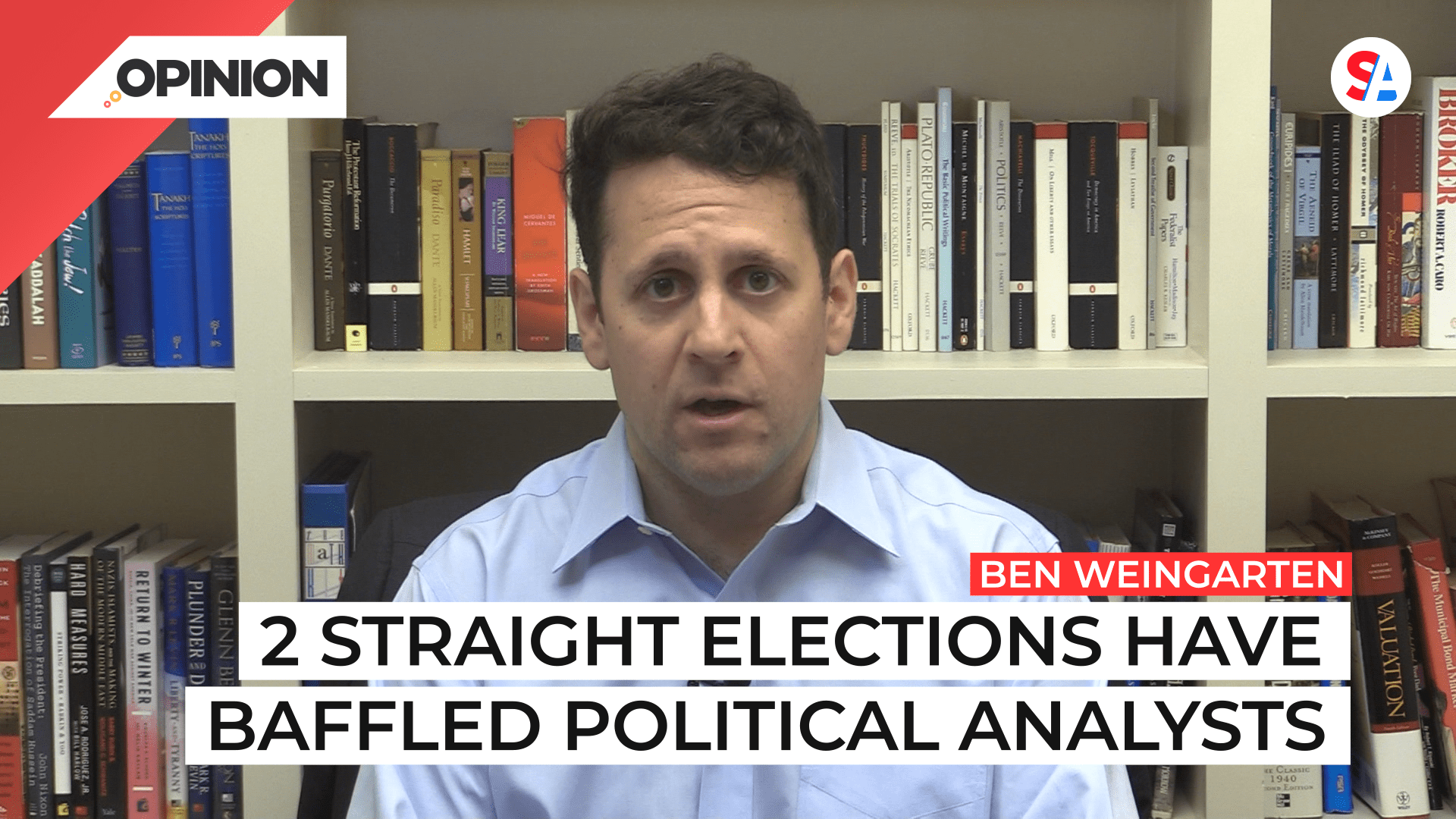
Commentary
-
Our commentary partners will help you reach your own conclusions on complex topics.
The midterm elections provided some historically odd results. Florida had a red wave. Republicans’ best-in-a-generation gains in New York suggested it would have legs. The GOP won the popular vote by several million people – about a 7-point swing from D to R in the popular vote from 2020 to 2022.
Add in the unpopular president, an economy in shambles that voters said was their number one issue, and the big midterm gains the out-of-power party usually makes under these circumstances, and that Republicans only secured the House by a razor-thin margin looks like a major anomaly.
As we said in our post-election commentary, there are any number of explanations for these results. For my money, I think after two straight elections that have baffled political analysts in terms of divergences in outcomes, and massive delays in hotly-contested swing states that we rarely used to see – we ought to look at common elements.
Maybe the most meaningful one is the voting system itself – one increasingly dominated by remote and early voting.
Whether you think it’s decisive, the radical alterations to our voting system from one in-person, with ID on a single election day, to one increasingly remote with lax ID standards, over election weeks, are a distinguishing feature of the last two races. One party advocated for them and was best-positioned to exploit them, and one party seems to have disproportionately reaped the benefits from them. When we see results coming in days after election night, and in these hotly-contested swing races with Democrats overwhelmingly seeming to prevail, it raises legitimate questions.
The questions are baked into the system itself. Mail-in voting leaves us to ponder whether:
The person casting the ballot is who he claims to be; someone other than the voter filling it out; the voter filled the ballot out under the watchful eye of a third party who might have been actively persuading, coercing, or inducing him to vote a certain way. And, whether one could ever hope to detect these and other issues.
We know that activists have targeted nursing homes and other presumably more vulnerable targets to drive absentee votes – obviously with the voters potentially facing pressure and perhaps unaware as to the candidates and the issues at play. Is that really democracy?
The potential issues multiply when we consider the increased duration of early voting, which means more time for fraud and other shenanigans to occur; the normalization of ballot harvesting; dirty voter rolls; and the partisan voter mobilization and participation drives that have marked recent races.
Before recently recanting, Jimmy Carter acknowledged via a bipartisan 2005 report on federal election reform, that “Absentee ballots remain the largest source of potential voter fraud,” citing just the points i did. The report added that “‘third-party’…voter registration drives” like those effectively facilitated by Zuckerbucks in 2020, and perhaps by federal agencies in 2022, “led to a rise in reports of voter registration fraud.”
As the New York Times wrote in 2012, “On the most basic level, absentee voting replaces the oversight that exists at polling places with something akin to an honor system. The Times continued, “Voting by mail is now common enough and problematic enough that election experts say there have been multiple elections in which no one can say with confidence which candidate was the deserved winner.”
Remote voting at very minimum presents the potential for less safe and secure elections. There have been myriad instances of people engaging in related fraud – even as hard as it is to detect; even the non-fraudulent behavior itself is sketchy or at minimum, unethical. The remote and early voting scheme calls into question the integrity of our races. Skepticism grows when you have in-person election day voters – disproportionately Republicans – facing hardships at the polls.
In 2022, from Maricopa County, Arizona to Mercer County, New Jersey, electronic tabulation machines malfunctioned en masse. Machines with literally one job on the one day they’re supposed to work, didn’t. The RNC alleged voter disenfranchisement in Maricopa, and sought to extend the time period on election night so people turned away or who faced issues could vote, but a judge dismissed the case.
Democrats who have fought tooth and nail for all manner of absentee ballots cast improperly to be counted – whether postmarked late or received after election day, or mismarked were silent.
In Luzerne County, Pennsylvania, 44 polling locations reportedly ran out of paper to print ballots. Ballot machines went down in Harris County, Texas. Problems proliferated nationwide.
And then Arizona and Nevada of course took days to report their results.
How is it possible in the most technologically advanced time in human history, when Florida with a population two times greater than Arizona and Nevada combined, could report results on Election Night, but the Sun Belt states couldn’t? It’s not a matter of *couldn’t*… it’s a choice to pursue a voting system that undermines our confidence in it.
The longer the time to election day and the more remote the vote, the greater opportunity for fraud and shenanigans – or at minimum the perception of it. Likewise, the longer time to count the votes, the greater our skepticism about the results.
Republicans now face a question: If the temporary COVID-driven emergency voting measures are now permanent and normal and without state control, they can’t vote return to the traditional elections model, then should they compete like Democrats and go all-in on ballot harvesting efforts however unsavory, driving early and absentee votes too?
Practically, they may have to. But this is an inadvertent admission that the American people themselves, by way of their leaders, no longer believe in an election system of the highest integrity. That we have now embraced a rotten system for two cycles is a telling commentary on the perilous state of our republic.
-
No, Trump is not causing a constitional crisis
Since returning to office, President Trump has signed a long list of executive orders, drawing strong reactions from both sides of the political spectrum. Many on the Left worry about the country’s changing direction, while many on the Right praise his speed and commitment to campaign promises. Some of these orders, however, are now tied… -
Humphrey’s Executor should be slated for execution
President Trump’s attempts to purge and downsize the federal workforce across myriad agencies and departments have been met with swift legal challenges. An array of judges have already issued preliminary injunctions, restraining orders and others rulings against the administration’s actions. Much of that pushback comes from the fact that the laws governing these agencies have… -
Gabbard, Patel key appointees in fight against Deep State
As President Donald Trump’s cabinet picks continue to be confirmed, two nominees have emerged as particularly divisive. The U.S. Senate confirmed former Hawaii Congresswoman Tulsi Gabbard as the eighth Director of National Intelligence (DNI), while the Senate Judiciary Committee recently voted along party lines to advance Kash Patel’s nomination as FBI director. Both nominations have… -
Trump, Musk are right to terminate woke USAID
Elon Musk came under heavy public criticism after he abruptly and unexpectedly terminated USAID, the United States Agency for International Development. Experts said that the swift termination puts millions of lives in immediate danger around the world, jeopardizes American national security interests at home and abroad and also threatens the integrity of the U.S. domestic… -
Trump is right, Palestinians must be relocated out of Gaza
On Saturday, Feb. 1, U.S. President Trump spoke with Egyptian President Abdul Fatah el-Sisi, urging him and Jordan’s King Abdullah II to accept at least 1.5 million Palestinian survivors of the war in Gaza. Critics have attacked the proposal as tantamount to forced displacement and ethnic cleansing — Donald Trump, in his own words, suggested…
Latest Opinions
-
 Reuters
Reuters
LeBron James first to reach 50k points, shows no signs of slowing down
-
 Getty Images
Getty Images
Trump admin seeking to sell nearly 450 vacant, underused federal spaces
-
 Getty Images
Getty Images
US stops intelligence aid to Ukraine amid overnight Russian attacks
-
 Getty Images
Getty Images
Gene Hackman’s dead dog misidentified as details continue unfolding
-
 Getty Images
Getty Images
Sexual violence used as war tactic against Sudanese children: UNICEF
Popular Opinions
-
In addition to the facts, we believe it’s vital to hear perspectives from all sides of the political spectrum.






